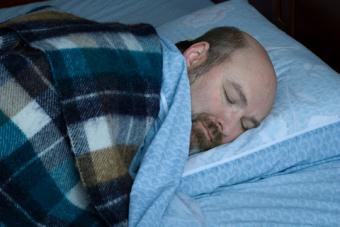
Sleep paralysis is a necessary aspect of sleeping because without it our bodies would physically react to occurrences in our dreams. This paralysis occurs at varying intervals throughout the course of sleeping, particularly during the REM stages of sleep.
The Reason for Sleep Paralysis
A hormone is excreted during the course of sleep that paralyzes the body. This is necessary for a couple of reasons:
- Without this paralysis, your body would physically react to your dreams. For example, if you were to reach out and grab something in your dream, you would mimic this motion physically while sleeping. The same goes for other actions while sleeping, such as running, walking and even violent actions. When put into this perspective, sleep paralysis is a very valuable temporary condition.
- Temporarily paralyzing the body allows for all the body's systems to rest at an optimum level.
Your body is not completely paralyzed throughout the entire sleep cycle. If it was, you would awaken in the exact position you fell asleep in every single night. Instead, the hormones regulating the paralysis fluctuate throughout the course of a full night's sleep.
Potentially Problematic
Although sleep paralysis is completely normal, there are some instances when the paralysis does not wear off right as the person awakens. This leaves the person temporarily paralyzed, yet completely alert. Patients with narcolepsy have been shown to be at an increased risk for this excessive sleep paralysis. Although the paralysis does wear off, it can be a very frightening occurrence for someone who wakes up but cannot move at all for a moment or two.
Sleep paralysis does not only happen upon waking, and can also occur when a person is in the process of falling asleep.
Hormonal versus Paranormal
People who encounter sleep paralysis upon awakening may also experience vivid hallucinations which can be likened to a dream-like state. They are awake and alert, yet they cannot move and see bizarre images before them.
For this reason, sleep paralysis is thought to be the culprit for many so-called paranormal experiences. People think they are being held down by a demon or spirit, but what is actually happening is their body has not yet recovered from the paralysis state. Combine the paralysis with a hallucination and some people are convinced that they have experienced something otherworldly.
There have also been instances of people believing that they must have a mental disorder because of these episodes. Although people with panic disorders are shown to be at somewhat higher risk for sleep paralysis, there is no correlation between this paralysis and the presence of a mental disorder. Plenty of people experience this phenomenon despite the absence of a mental disorder.
Treatment
In some cases, sleep paralysis is so severe that medical help is needed. Although sleep paralysis is not physiologically damaging, it can become a real problem for the person experiencing these episodes of paralysis. Sleep can become a dreaded experience instead of a restful one.
There are some medications available which have been shown to lessen - or even cease - instances of sleep paralysis. Additionally, medical professionals suggest that people who prime themselves for a good night's sleep will have fewer encounters with this paralysis. In other words, a person who does not get adequate sleep - or quality sleep - is at a higher risk of experiencing this phenomenon than someone who makes a concerted effort to get the best night's sleep possible.
To avoid instances of paralysis when falling asleep or waking, make sure to:
- Get the recommended amount of sleep every night.
- Do whatever you can to ensure the sleep you get is high quality.
- Regulate your sleep schedule to keep it consistent.
Contact your doctor with concerns regarding any episodes of paralysis you have that you consider worrisome.







